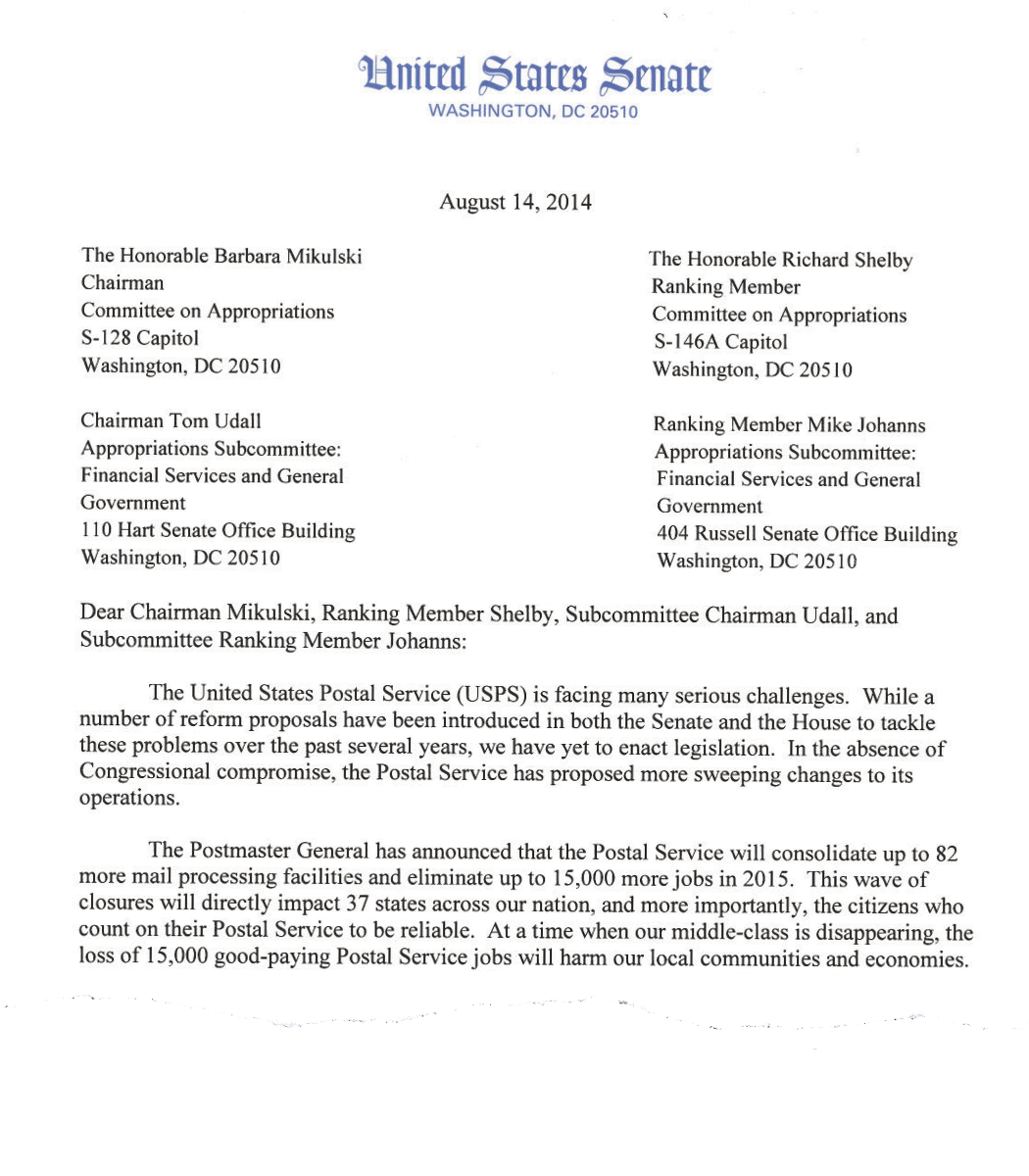September 11, 2014
Consolidation Attack – We Must Mobilize!
(This article appears in the September/October 2014 issue of The American Postal Worker magazine.)
 When the USPS announced on June 30 that it would move forward with plans to close or consolidate 82 more mail processing plants, it was a declaration of war. Not just on postal workers, but on postal customers and on the existence of a public Postal Service for future generations.
When the USPS announced on June 30 that it would move forward with plans to close or consolidate 82 more mail processing plants, it was a declaration of war. Not just on postal workers, but on postal customers and on the existence of a public Postal Service for future generations.
And while many postal workers understand the devastating effect the closure or consolidation of 82 plants will have on service, very few postal customers do: The consolidations will eliminate overnight delivery of first-class mail – even mail sent from one address to another within the same city or town.
We must make sure the American people understand this fact, and we must mobilize them to work with us.
We also must point out that management is relying on obsolete “feasibility studies” that were conducted several years ago to justify the consolidations. Many of the factors the studies evaluate have changed since the studies were done, but the Postal Service has refused to conduct new studies.
Management is also refusing to hold new public meetings in the affected areas to allow for input from residents and businesses.
We must demand that the USPS conduct new studies and hold new public meetings. If management refuses, we should organize meetings ourselves!
How Do We Mobilize?
Back in the day, there was a training center, the Highlander Folk School in Monteagle, TN, that taught activists how to work together for change. It was established in 1932. Rosa Parks, Dr. Martin Luther King Jr. and Rep. John Lewis (D-GA) attended the school, along with many other great leaders.
Today, leaders like Rep. Lewis and Rep. Keith Ellison (D-MN) continue to fight injustice. Coalitions begin when we support each other. In August, the APWU spoke at an event that announced the introduction of the Employee Empowerment Act to protect workers who organize unions. We shared the fact that postal workers around the country are mobilizing community organizations and we are in need of activists in every town and city to save our overnight delivery, our national treasure and living-wage jobs. We can build a power base and get Congress to pass laws to protect workers and services only when we help each other.
To get started, locals should establish committees of activists to set goals, form coalitions with other organizations in the community, select dates, and make specific plans. Be sure to reach out to other labor organizations, starting with our brothers and sisters in the other postal unions. Develop a list of media contacts. Get your elected officials on board, including the mayor, local and state officials, senators and congressional representatives. Reach out to community organizations and ask them to join the fight. Think about businesses that will be negatively affected and invite them to participate. And remember to invite representatives from the gaining facilities to your meetings and get them involved.
Step up and get involved. Now is our time.
We’ve Already Begun to Fight!
We’ve been working to get support in Congress. With your support and encouragement, more than half the Senate signed on to a letter that calls for a one-year moratorium on USPS plans. As we go to press, we are working to win support for a similar letter in the House.
At the national level, the union has published a toolkit outlining many of the basic steps involved in building resistance to the consolidations, which can be found at www.apwu.org, under the Vice President’s Department. And at the National Convention in July we conducted a workshop and held a strategy session where delegates shared ideas about how to fight.
Immediately after the convention, we formed a work group at the national level with representatives of the four postal unions. All of the postal unions realize that if management pushes consolidation through, the effect will be devastating on all of us.
In August, the four unions held a joint webinar with affected locals to train organizers at each of the 82 sites. We are developing ways to assist local coalitions as well as provide training in other offices that have been affected by consolidations.
Other Arenas
We are also looking into working together at the local and national level to invest in economic studies to show the real cost of consolidation for the USPS and for individual communities.
The Postal Regulatory Commission (PRC) announced in June that reports of delayed mail delivery have increased, with more than 7,000 complaints filed. In fact, the PRC hired an additional staff person to handle the influx of complaints.
Many of the gaining facilities simply cannot handle the losing facility’s mail. They have been sending their own mail to other facilities not involved in consolidation and employees have been working excessive overtime. The USPS is frequently unable to keep aisles clear because of the overload of mail. Locals should make sure members file Forms 1767 to report safety hazards, along with grievances and OSHA Complaints.
At the national level, we have filed a Step 4 Dispute protesting the USPS consolidation actions, and we are exploring legal options.
But this fight won’t be won in the grievance procedure alone or in court. It will be won with the support of people whose communities are about to lose jobs and good postal service.

